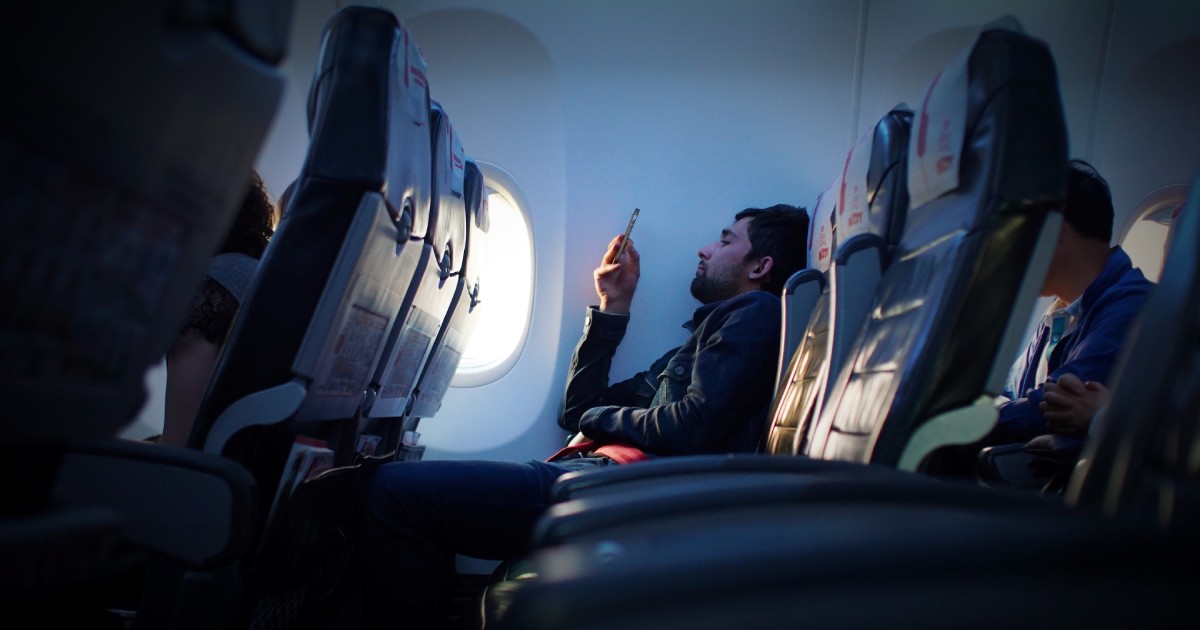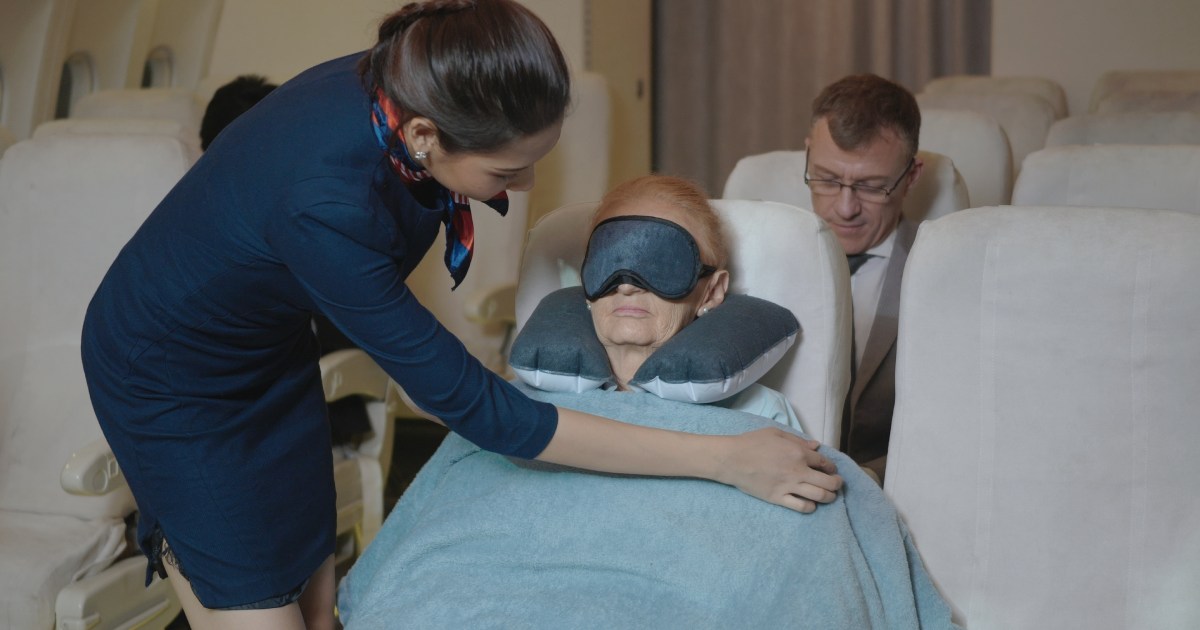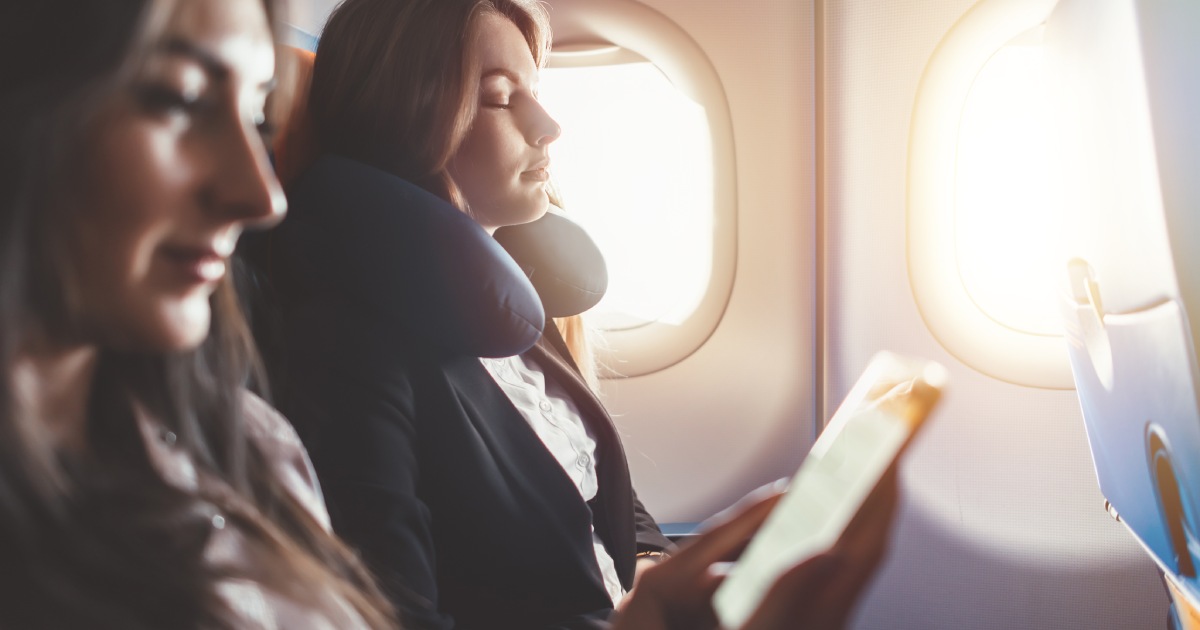The most important facts about “sleeping on an airplane”
- Sleeping on the plane can shorten the flight time.
- Sleeping on the plane can help to minimize jet lag.
- Choosing the right seat has a significant impact on your comfort on the plane.
- Use a sleep mask and earplugs to minimize light and noise.
- Bring a neck pillow to support your head and wear comfortable clothing.
- For shorter flights with stopovers, it is advisable to stay awake to avoid missing your connecting flight.
- It is polite and practical to be awake during meal service to accept meals and clarify needs.
Did you have a flight delay or cancellation? Check your rights now and increase your chances of compensation
A good night’s sleep on the plane can be a real blessing for frequent travelers to keep fatigue and jet lag at bay. Who hasn’t heard the tempting promise of a good night’s sleep on a long-haul flight and arriving at your destination feeling rested? But the reality is often different. In this blog article, we explore the world of sleeping on an airplane and present you with valuable tips and tricks on how you can get a good night’s sleep even high above the clouds.
We will show you when it is advisable to lie down during a flight and in which situations you should rather forgo sleep. After all, the quality of sleep on a plane is not always optimal, and there are a number of factors that need to be taken into account in order to optimize the experience. In addition, we will share proven advice on how to find the best possible sleeping position on the plane and how to deal with the challenges of airplane pressure.
So check out this blog to find out how you can turn your next flight into a restful sleep opportunity. Whether you’re a seasoned frequent flyer or an occasional vacation traveler, this article will provide you with valuable advice to make your next flight more comfortable and restful.
Is it good to sleep on an airplane?
Should you sleep on an airplane? Yes, it is usually good to sleep on an airplane, especially on long flights. Sleeping on the plane can help to shorten the time during the flight and minimize jet lag, especially if you arrive in a different time zone. A good night’s sleep on the plane can also help you feel rested and refreshed when you arrive. However, there are a few things that should be considered to ensure a comfortable night’s sleep on the plane.
However, it is important to note that not everyone can sleep well on an airplane. Some people find it difficult to sleep in unfamiliar environments and there may also be turbulence or other discomforts that can affect sleep. It is therefore advisable to prepare well and take individual needs into account.
When you should not sleep on an airplane

There are some situations in which it may not be advisable to sleep on an airplane. These include, for example, shorter flights where sleep may be insufficient or even disruptive. It can also make sense to stay awake on flights with stopovers so that you don’t miss your connecting flight. An overview of the points that need to be considered:
- Take-off and landing: During take-off and landing, it is important to be alert and follow safety instructions. Passengers should be alert and responsive during this phase.
- Food service: When meal service is underway and flight attendants are serving meals, it is polite and practical to be awake to receive meals and clarify any needs.
- Short-haul flights: On very short flights, there may not be enough time to fall asleep and rest.
- Health concerns: People with certain health concerns, such as thrombosis or back problems, may need to get up and move around regularly on longer flights instead of sleeping most of the time.
- Emergency procedures: In the unlikely event of an emergency, it is crucial to be awake and alert in order to follow the crew’s instructions.
It is important to emphasize that individual circumstances may vary. Some people may have difficulty sleeping on the plane due to insomnia or other health issues. It is always advisable to pay attention to the flight attendants’ instructions and take individual needs into account.
What is the best way to sleep on an airplane?

What is the best way to sleep on an airplane? How to sleep on an airplane? To sleep well on an airplane, it is important to be comfortable on long-haul flights. Bring a neck pillow to support your head and wear comfortable clothes. Avoid caffeine and alcohol before bed and try to adjust to the time zone of your destination. Use a sleep mask and earplugs to minimize light and noise, and avoid eating too much at once. Be sure to stretch before bed and take some short walks on the plane to promote circulation and avoid muscle stiffness.
What should you pack in your hand luggage to help you sleep on the plane?
For a comfortable sleep on the plane, it is advisable to pack certain items in your hand luggage. A neck pillow provides support for your head and neck and makes sleeping more comfortable. A sleep mask helps to block out light sources and earplugs can help to minimize disturbing noises. Also consider bringing earphones or headphones to relax with soothing music or noise canceling. A scarf can also be helpful to keep you warm and avoid uncomfortable air conditioning.
Are you having trouble with a cancellation or flight delay and don’t want to accept it without doing anything? You shouldn’t either. After all, you are entitled to compensation in many cases of delay or cancellation.
Flight delay compensation, flight cancellation compensation
Compensation for overbooking
Compensation for denied boarding
Order Flightright conveniently online:
We enforce your refund and compensation!
With us, you can check your claims free of charge in two minutes. You can receive up to 600 euros compensation per person (minus the success commission).
When did the airline inform you of the flight cancellation or delay?
On the day of the flight or less than 14 days before or more than 14 days before departure.
Are you also affected by a missed connecting flight? Check your flight now. Simple ✔ fast ✔ & without risk ✔
Sleeping on an airplane – How to deal with the pressure
When sleeping on an airplane, it is important to pay attention to pressure equalization in the inner ear to avoid unpleasant sensations. During the flight, the pressure conditions in the cabin can change, which can lead to an unpleasant feeling of pressure in the ears. To counteract this, it is advisable to consciously yawn, swallow or chew gum during the descent or approach to the landing site. If you often have problems with pressure equalization, you can also use decongestant nasal sprays or drops as a precaution. Wearing earplugs can also reduce the pressure difference and ensure a more relaxed sleep during the flight. These measures help to equalize the pressure in the inner ear and prevent possible discomfort so that you can sleep more relaxed on the plane.
Which medication for sleeping on the plane?
Some people prefer to take over-the-counter sleep aids such as melatonin to help them sleep on the plane. Melatonin is a hormone that regulates the sleep-wake cycle. However, it should be taken in appropriate doses and after consulting a doctor. Note that medication can affect different people differently and it is important to consider your individual needs and health conditions.
Are sleeping pills allowed on airplanes?
Yes, sleeping pills are generally allowed in both checked and carry-on baggage. However, it is recommended to carry them properly in their original packaging and clearly labeled. It is also advisable to present a certificate from your doctor if required. Note, however, that some doctors advise against taking sleeping pills during the flight, as some side effects such as sleepwalking can occur and it can be difficult to react to such situations.
Sleeping on the plane: 10 tips for long-haul flights
1. Choose the right seat – pay attention to where you sit
Choosing the right seat can have a significant impact on your comfort during the flight. For example, if you prefer a peaceful night’s sleep, a window seat is often beneficial as it allows you to lean against the cabin while you sleep. However, if you need to get up easily or want quick access to the toilets, an aisle seat is practical. Also consider the proximity to emergency exits, as these often offer more legroom. Avoid seats near toilets or galleys, as they are often busier. On long-haul flights, seats near children’s areas may be less quiet. Consider your personal preferences and needs when choosing your seat. Secure the best seat 24 hours before departure using your airline’s online check-in.
2. Use the seats that remain free
Another tip for a better night’s sleep on the plane is to take advantage of any empty seats. If the flight is not fully booked, you can try to find an empty seat next to you. As soon as the seat belts can be removed, politely ask a flight attendant if it is possible to move to an empty seat. An extra seat will allow you to stretch out and sleep more comfortably.
3. Wear comfortable clothes – choose suitable clothing
An important tip for a comfortable sleep on the plane is to wear comfortable clothes. Opt for loose, breathable clothing that is not restrictive and does not impair blood flow. Avoid tight shoes and instead choose comfortable slip-ons or socks to take the pressure off your feet. By wearing layers, you can better adapt to the often changing temperatures in the aircraft cabin. Comfortable clothing will go a long way to helping you relax and sleep better during the flight.
4. Sleep on the plane – avoid interruptions
To sleep better on the plane, it is important to minimize interruptions. Choose a seat away from high-traffic areas such as restrooms or galley kitchens to reduce noise and light disturbances. Use earplugs or noise-canceling headphones to minimize ambient noise. Put on a sleep mask to protect yourself from light sources. Also inform the flight attendants that you would like to sleep during the flight to minimize possible interruptions. By taking these measures, you will create a quieter environment that is conducive to a restful sleep on the plane.
5. Have personal feel-good accessories with you
An important tip for a restful night’s sleep on an airplane is to take personal wellness accessories with you. These include sleeping goggles to block out light sources, noise-cancelling earplugs or headphones with a noise-cancelling function to minimize disturbing noises. Earplugs are an additional option for noise protection. On longer flights, basic hygiene items such as a toothbrush and toothpaste, deodorant, moisturizer and hygiene wipes should not be missing. These personal accessories will help you feel comfortable and relaxed during the flight, which in turn increases the chances of a good night’s sleep.
Passengers should check whether meals are included when booking a flight ticket. If not, they may be in the dark about how long it will take and whether it is possible to order something on board. With a little preparation, you can make sure you don’t have to wait for landing with a growling stomach: Check the airline’s website for catering before your flight and take emergency food with you on board.
Affected by a flight delay/cancellation/rebooking?
- Short distance flight delays – up to 1500km – Passengers are due €250 compensation
- Medium distance flight delays – between 1500km and 3500km – Passengers are due €400 compensation
- Long distance flight delays – over 3500km – Passengers are due €600 compensation
According to the EU Passenger Rights Regulation, the amount of compensation is calculated according to the flight route:
| Short distance up to 1500 km | Medium distance up to 3500 km | Long distance from 3500 km |
| e.g. London – Edinburgh | e.g. London – Athens | e.g. London – Tokyo |
| 250€ | 400€ | 600€ |
6. Economy class upgrade – Let us upgrade you
Travelers often find it difficult to sleep on the plane. A smart tip for a potentially better night’s sleep on the plane is to ask for an upgrade. In some cases, airlines may offer upgrades if seats are available. This may include premium economy class or even business class, which often offer more legroom and comfort. Also look out for special offers or mail programs from your airline that may offer the possibility of an upgrade. With any luck, you may be able to treat yourself to a more comfortable night’s sleep on the plane. These seats make it easier to lie down more comfortably and sleep better. It doesn’t hurt to politely ask for an upgrade, especially if the flight is not fully booked. However, be aware that upgrades are not always available, and be prepared that occasionally it may not be possible to upgrade.
7. The right pillow – don’t forget your neck pillows
A practical tip for a restful sleep on the plane is to take a suitable neck pillow (airplane pillow) with you. A neck pillow not only provides extra comfort, but can also help to support the head and neck, especially if you want to lean or sleep in a sideways position. There are special neck pillows for travel that are compact and lightweight to fit comfortably in hand luggage. Choosing the right pillow that suits your sleeping habits can make a significant difference and help you relax and fall asleep better during the flight.
8. Avoid coffee and (too much) alcohol – eat right

To sleep better on the plane, it is advisable to avoid drinking coffee and excessive alcohol. Caffeine, which is contained in coffee, has a stimulating effect and can disrupt sleep. Although alcohol can initially make you tired, it impairs the quality of sleep and can lead to restless sleep. Instead, it makes sense to focus on a balanced diet and choose light meals. Avoid heavy, fatty foods as these can impair digestion. Drink plenty of water to stay well hydrated. A healthy diet helps to keep the body in balance and promotes a more restful sleep during the flight.
9. Use sleep aids – some aids can calm the body
The use of sleep aids on an airplane should be done with extreme caution and preferably in consultation with a doctor. Some people prefer natural sleep aids such as melatonin, which regulates the sleep-wake cycle. This can be taken in small doses to help you adjust to new time zones. However, it is important to note that not all sleep aids are suitable for use on airplanes and some may even impair responsiveness. Always consult a professional or doctor before taking sleep aids to ensure they are suitable for your individual needs and health conditions.
10. Bedtime ritual – incorporate sleep routines
An effective tip for better sleep on an airplane is to practice a bedtime ritual and incorporate sleep routines. Try to create a routine that matches your natural sleep rhythm, even if you are in an unfamiliar environment. This can include reading a book, listening to soothing music or performing relaxing breathing exercises. Incorporating personal sleep habits into your airplane sleep can signal to your body that it’s time to relax and wind down. In addition, sticking to a regular sleep routine can help minimize jet lag and help you adjust to new time zones more quickly.
Bonus:
Consider the time zone you are flying to
Another important tip for a restful sleep on the plane is to consciously consider the time zone you are flying to. Try to adjust to the local time at your destination before your flight. This means adjusting your sleeping habits accordingly and adapting to the rhythm of the new time zone during the flight.
If you want to sleep during the flight, try to do so at the “right” time, based on the time at your destination. Use the on-board lighting and darkness to adjust your sleep-wake rhythm. If it’s bedtime at your destination, use a sleep mask to block out light and try to relax.
Adjusting to the time zone at your destination can help minimize jet lag and help you acclimatize faster. It’s also important to drink enough to hydrate your body, as dehydration can exacerbate the symptoms of jet lag.
Sleep-fly: simply sleep through the night
The cabin crew will always look after your well-being and check your seat belt several times for safety reasons. To ensure that you are not awakened rudely, we recommend that you fasten your seat belt so that it is clearly visible over your clothing or blanket. Also fold up your table and stow your hand luggage safely. This way you can sleep undisturbed without being disturbed by the crew or fellow passengers.
Turn flight time into reading time
And if nothing helps: reading is always a good solution! Perhaps your book is so captivating that you don’t want to fall asleep at all. Or it may be so boring that you fall into a deep sleep in no time at all. And even if you have difficulty falling asleep on the plane or suffer from a fear of flying, reading can be a helpful distraction. By concentrating on the story or the content of the book, you can distract your thoughts from possible fears and thus fly more relaxed.
Sleeping on the plane: sleep tips for children
Children often find it difficult to sleep on a plane. Every child is unique, so it can be helpful to try different approaches and cater to your own child’s needs. If sleep problems persist, it is advisable to discuss this with a pediatrician. Here are some sleep tips for children:
- Regular sleep schedule
- Soothing sleep ritual
- Suitable sleep environment
- Limit screen time
- Healthy diet
- Sufficient physical activity
- Conversations about anxiety
- Consistent sleeping habits
Conclusion on sleeping on an airplane
Overall, sleeping on an airplane can be a restful experience with the right tips and tricks. Choosing the right seat, wearing comfortable clothing and using sleep masks and neck pillows can help improve the quality of sleep during the flight.
Although sleeping on a plane is not comparable to resting at home, it can make the flight much more enjoyable and minimize jet lag. Ultimately, however, the quality of sleep on an airplane depends on individual preferences and needs, which is why it is important to try out different strategies to find the ideal method for you.
How can Flightright help you?
Are you stuck at the airport due to a flight delay? Your flight has been canceled or you have been removed from the passenger list (denied boarding)?
In each of the situations described, you as a passenger have a right to compensation.
According to the EU Passenger Rights Regulation, passengers are entitled to compensation in the event of a delay, cancellation, overbooking, or missed connection. You can claim up to 600 euros of compensation per person (minus commission fee). This compensation is independent of the ticket price. Flightright enforces your right for you. If necessary also in court.
Tip: Flightright helps you to enforce your passenger rights! With us, you can check your claims free of charge in two minutes. ✔️Easy, ✔️fast ✔️& without risk
As the market-leading consumer portal, Flightright fights for the enforcement of air passenger rights. We stand up for your rights in the event of a flight delay, cancellation or denied boarding and refer to the European Union’s Air Passenger Rights Regulation 261/2004. Flightright’s air passenger rights experts are also happy to help you with ticket refunds and refunds for canceled package tours.
As experts in the field of air passenger rights, we enforce your right to compensation against the airline!

